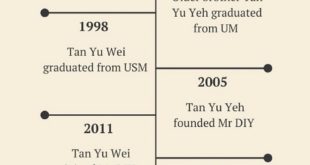If you haven’t noticed, the new K-drama, Start-Up has been consistently on Netflix’s “Top 10 In Malaysia Today”.

It has even been Number 1 for a few times now, so I had to check out what the hype around this new K-drama was all about.
Some big names you’d probably recognise are starring in that drama are Bae Suzy (my fave) and Nam Joo-hyuk, the two leads of the show.

So far, there are only 6 episodes when it premiered on October 17. The season finale will be on December 6 totaling to 16 episodes.
I’ll try not to put out too many spoilers as I review the six episodes I’ve watched so far.
The Startup And Techpreneur Ecosystem In Seoul
You’d probably guess from the name that the plot of this K-drama would be something related to the startup life.
The show starts off with two sisters who have to choose between their soon-to-be-divorced parents.
Their parents were at odds with each other because their father wanted to start his own business, whereas their mother wanted a stable life and didn’t believe in her husband’s business.
Bae Suzy who plays Seo Dal-mi, chooses her father whereas Kang Han-na who plays Seo In-jae, chooses her mother.
Over time, their choices led to very different lives from one another.

Their father successfully pitched his business idea, which was a food delivery app like Grab, and secured investors but died in an accident.
So, Dal-mi ended up living with her grandmother who sells corn dogs for a living, pushing her to take up all kinds of part-time jobs to feed themselves.
Their mother on the other hand, married this tycoon which drastically changed their lives in status in society.
In-jae then could no longer relate to Dal-mi, so she cut off ties with her younger sister and left for the US to further her studies.
They later meet in their twenties at Sandbox, a place for techpreneurs to run their startup with a mentor, an office and staff for 6 months.
Sandbox is like a fictional South Korean Silicon Valley, and Malaysian viewers are likening it to MaGIC.

So the sisters compete for the 5 spots in Sandbox and the story goes from there.
What I Liked About The Show
Learning Terms Relevant To The Startup Life
If you’re a newbie in the startup and techpreneur world, this is a good place to start and get entertained while you’re learning.
Throughout the show, they would provide definitions of words like venture capitalist (VC), accelerators, key man, angel investor, funding round, and more.
These definitions would also relate to the scene that’s currently happening, which makes it easier to process what these terms mean and what they do.
Not all the definitions will be translated into the English subtitles though.
That being said, I had to do some fact-checking on whether or not everything they have is correct.
A Silicon Valley insider explained in his review that the series does portray accurate facts on how startups work and software development, at least at a high level.
However, there are times where it chooses artistic license over accuracy, like portraying Amazon as a venture capital firm, or oversimplifying the process of applying to enter an accelerator.
Some Advice On Running A Startup
Throughout the show, you’ll be able to learn some insights and advice from the VCs and mentors.
The scene that I found the most interesting so far is in episode 6, where the founding members of a tech startup discuss how the shares will be split with their mentor.
2 companies ended up physically fighting to the point where one of them quit because of it.
When they thought the shares should be split equally among all 5 founding members, the mentor rejected the idea and explained why no one would invest in their company.
This is because investors would lose their shares if a company splits up.
Once a funding round begins, investors will start buying up shares.
It won’t be long before an investor owns 35% of the company’s shares.
In a worst-case scenario, one of your members can decide to betray you and side with the investor to take control of the company or sell it.
Hence, you’ll need to give the key man the majority of the shares in the beginning to protect your company.
However, some startups understood the importance of this while some didn’t, which was a make-or-break situation for them to get to Sandbox.

Great Character Complexity And Development
Generally, I enjoy shows that don’t narrow their characters’ personalities to “good” or “bad”, and Start-Up didn’t disappoint.
While there are characters that chose selfish and disappointing paths, the show makes an effort to show their side and get the audience to empathise with their choices.
Moreover, even with just six episodes in, they are already showing organic and great character development in many of the characters.
Cocky characters become more humble, insecure characters become more confident, and the list goes on.
What I Didn’t Like About The Show
Stereotypical K-drama Clichés
As promising as the plot and concept are, you can expect a stereotypical K-drama trope in Start-up.
Some of these clichés include:
- Rich (and rude) guy, poor girl
- Wrist-grabs
- Second-lead syndrome
- A mean girl
- Slo-mo romantic scenes
- Main girl oblivious to her crushes

The good thing at least is that the rude guy isn’t mean to the main girl nor bullies her, so far.
I’ll admit that even though these overused clichés made me cringe a little, the plot and concept did make up for it.
-//-
As we are still in the beginning of the season, the K-drama is already picking up so well among Malaysian viewers.
For those already in the entrepreneur ecosystem, this K-drama is unlikely to teach you anything new, but for those who aren’t, it’s an easy and fun introduction to the startup world.
If you’ve caught up with all 6 episodes so far, what are your thoughts on what will happen next?
What do you think Dal-mi will do when she finds out the secret everyone has been hiding from her for 15 years?
Featured Image Credit: Netflix



